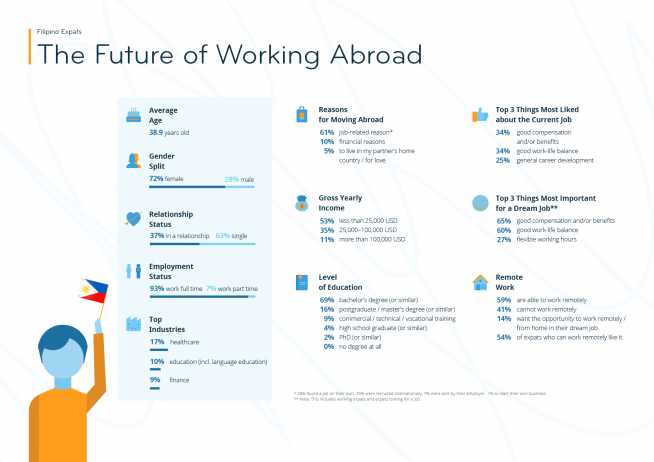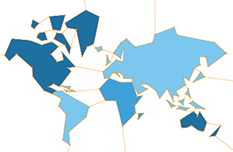Filipino Expats Are Younger than Average and Mostly Female
Why do Filipinos move abroad? According to the Expat Insider 2021 survey by InterNations, 61% of Filipinos working abroad name their career as the most important reason for relocating to another country. Globally, just 47% of working expats moved abroad for job-related reasons. Most of these Filipino expats found a job on their own (28%) or were recruited internationally (25%). Just 7% were sent abroad by their employer, and only 1% moved abroad to start their own business. Aside from work-related reasons, an above-average share of Filipinos working abroad (10%) simply moved abroad for financial reasons (vs. 2% globally).
The Typical Filipino Expat Working Abroad Is Actually Atypical
With an average age of 38.9 years, they are significantly younger than the average working expat (43.1 years old). While globally, the gender ratio among working expats is split more or less evenly (53% male and 46% female), Filipinos have a much higher share of women (72%) than men (28%). Additionally, a higher-than-average share (93%) works full time (vs. 82% globally), and only 7% work part time, less than half the global average of 18%.
Continuing the trend of non-typical survey results, many Filipino expats work in the field of healthcare (17%), almost triple the global average for working expats (6%). This staggering figure is followed by 10% working in education and 9% working in finance, which is, however, fairly close to the global average (12% and 8%, respectively).
Mid-Level Degrees, Middle Management Positions
When it comes to their level of education, the Expat Insider survey shows that Filipino expats tend to hold mid-level degrees. In fact, 69% of Filipinos working abroad have a bachelor’s degree (or similar), which is more than double the global average of 33%. On the other hand, the share of working Filipino expats with a postgraduate degree / master’s degree (16%) is only about one-third of the global average (47%). Similarly, only 2% have a PhD, compared to 8% globally.
This tendency towards mid-level degrees seems to also be reflected in their current employment situation. The biggest share (29%) works in lower or middle management, which is significantly higher than the global average (17%). While 26% have a senior/specialist position (vs. 30% globally), a much lower-than-average share (6%) work as top managers or executives (vs. 13% globally). Lastly, just 3% are self-employed / freelancers, compared to 11% of working expats globally.
Filipinos Often Work in Destinations Lacking a Good Work-Life Balance
Working Filipinos frequently relocate to the Middle East, which is another fact that distinguishes them from the average Expat Insider respondent. In fact, their most common destination is the UAE, with 20% living and working there (vs. 4% globally). This destination is followed by Saudi Arabia (8% vs. 2% globally) and Qatar (6% vs. 2% globally).
According to expats living in these countries, none of them perform well in terms of working hours and work-life balance. Expats from the Philippines do not seem to be too bothered, though: around two-thirds are satisfied with their work-life balance (65% vs. 68% globally) and working hours (67% vs. 70% globally). These figures are barely lower than the worldwide average even though Filipino expats also work longer hours than the average expat: the average working hours among all Filipino expats amount to 43.1 hours a week, compared to 39.9 hours globally.
What Filipinos Working Abroad Like about Their Current Job
When Filipino expats are asked what they like best about their current job, the two aspects they mention most frequently are a good compensation and/or good benefits, as well as a good work-life balance (34% each). Overall, more than seven in ten Filipinos working abroad (71%) have a gross yearly income of 50,000 USD or less (vs. 44% globally). Only 11% earn more than 100,000 USD per year (vs. 23% globally). Another 25% cite their general career development as something they particularly appreciate. In fact, 47% are satisfied with the local career opportunities.
Working Remotely Is Uncommon for Filipino Expats
Fewer than three in five Filipinos working abroad (59%) are able to work remotely, which is 19 percentage points below the global average (78%): among them, 17% are able to work remotely but usually prefer not to (vs. 16% globally). In fact, just 16% of those who benefit from remote-work policies work remotely for 15 days per month or more (vs. 18% globally) and 23% work fully remote (vs. 39% globally). On the other hand, 43% work remotely for up to five days a month (vs. 25% globally).
Filipino expats do not seem to mind that they cannot work remotely more frequently: out of those who are able to work remotely, just 54% actually like doing so (vs. 65% globally). However, only 7% actively dislike it (vs. 14% globally) — 39% are simply neutral when it comes to remote work (vs. 21% globally).
Lastly, about one-quarter (26%) also state that they cannot work remotely due to the nature of their job, compared to 16% globally who say so. This is most likely related to the fact that healthcare and education are the most common fields of work for Filipinos working abroad.
What Filipino Expats Working Abroad Wish For
When Filipino expats are asked to think about their future dream job, a good compensation and/or benefits (65%), as well as a good work-life balance (60%), are factors that remain highly relevant for them. About three in ten (27%) also consider flexible working hours to be quite important when imagining their dream job.
Interestingly, creative/interesting tasks, which constitute the third most frequently mentioned aspect globally (29%), do not seem to be so relevant to working expats from the Philippines. Just 12% consider this factor important. The opportunity to work remotely is also a factor they do not seem to consider necessary for their dream job: just 14% of Filipinos working abroad find it important (vs. 22% globally).
“Filipino expats look for jobs that offer them a good compensation and a decent work-life balance,” says Malte Zeeck, InterNations Founder and Co-CEO. “While more modern approaches to today’s working life, such as remote work and personal fulfillment through creative tasks, are important to many working expats today, this is not the case for those from the Philippines. This might be related to the relatively low importance of these aspects in their home country.”
In fact, 65% of Filipinos working abroad say that factors like autonomy, freedom, creativity, personal development, and self-fulfillment are more important in the business culture of their host country than at home in the Philippines. These values are closely related to the concept of New Work, which describes the new way of working in the global and digital age. On a global scale, just 49% of expats say the same about their home country as compared to their host country.
According to expats, the Philippines only comes 40th out of 55 countries when they are asked to rate how much of a role the concept of New Work plays in the local business culture. Just 44% of expats in the Philippines say that this concept is important there (vs. 58% globally). The top 3 destinations where Filipino expats live and work all rank considerably better than that: Qatar (18th) and Saudi Arabia (19th) make it into the top 20, and the UAE even ranks 2nd out of 55 destinations worldwide.




